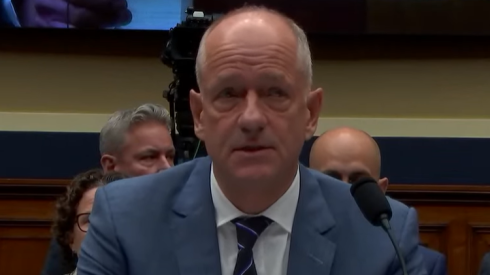Latest Stories
The Mount Rushmore State’s chief technology officer of more than nine years will depart next month after almost three decades of service. The search for his successor is already in progress.
More Stories
- Students, Staff Wary of AI Weapons Detection at Baltimore Schools
- UPenn's AI Masters Program Intends to Shape Policy, New Jobs
- States Rethink Data Centers Due to Strain on Electrical Grids
- Can AI Deepfakes, Robocalls Influence the 2024 Election?
- Massachusetts to Double Community-Based Air Quality Sensors
More Stories
The man, who was arrested last week, is suspected of allegedly defrauding two elderly victims of thousands of dollars in April via an online phishing scheme. He faces a federal charge of conspiracy to commit wire fraud.
The International Collegiate Programming Contest, organized by the Association for Computing Machinery (ACM), will name the best student programming teams in the world based on their performances in timed challenges.
City law enforcement does not have facial recognition, but an ordinance permits the temporary use of unapproved technologies in pressing circumstances. Here, it identified a suspect who otherwise would likely have evaded arrest.
The Capitol Region Council of Governments is looking for a vendor to bring rentable scooters and bikes to Hartford and New Haven, Conn. The move is about six months after the shuttering of electric scooter provider Supermobility.
States across the country are laying the foundation for a strong data program, but many admit there's a lot of work ahead of them. At NASCIO, we learned from Minnesota CIO Tarek Tomes and Texas CIO Amanda Crawford about how they support data literacy at the enterprise level.
Two dozen New York schools and districts joined litigation against Meta, TikTok, Snap, YouTube and other social media companies, seeking changes to their platforms and damages for student mental health issues.
Alaska CIO Bill Smith said that while ransomware is a huge threat and priority for him and the other state CIOs at the NASCIO Midyear conference, the most important way to turn the tide is getting back to basic cyber hygiene.
Various levels of Michigan police agencies launched a wide crackdown on distracted driving Monday, using unmarked spotter vehicles to catch drivers who are simultaneously using their phones.
America’s young people face a mental health crisis, and adults constantly debate how much to blame phones and social media. A new book spurs conversation around the issue.
Minnesota's licensing and permitting system for outdoor recreation — everything from bobcat trapping to Nordic skiing on state trails — will undergo an electronic transformation next year.
The department is giving money to 16 colleges for programs that train or upskill students for work in fields such as advanced manufacturing, IT, and infrastructure-related sectors like transportation and renewable energy.
Artificial intelligence is quickly becoming mainstream for public agencies. But as state tech leaders look toward the benefits of the technology in the coming years, they are also sounding cautionary notes.
State leaders want computational thinking, programming, artificial intelligence, cybersecurity and digital citizenship to be part of computer science, but decisions to require them will be made by local school boards.
Experts recently discussed new early-warning tools, strategies for disrupting cyber criminals long term, and awareness and preparation campaigns that reach everyone.
After Nevada released AI guidelines last fall, CIO Tim Galluzi talked at NASCIO about how they’re using GenAI in the Department of Employment, Training and Rehabilitation to streamline processes.
As the deadline for year two funding approaches, Washington CISO Ralph Johnson talks about the state’s spending priorities with historic federal support for cybersecurity as the NASCIO Midyear conference gets underway in National Harbor, Md.
Public-private endeavors involving the city and Bexar County aim to help roughly 35,000 homes get connected. Two pacts with Internet providers would extend infrastructure before Affordable Connectivity Program funding ends.
After a private university in New York announced that an artificial intelligence-powered robot would deliver this year's commencement address, students gathered more than 1,600 signatures on a petition against the idea.
The Omni Fiber deployment is part of its planned expansion across Mercer County. Work began this month and service is expected to launch in phases beginning in August. The project will not require state, federal or local funding.
A Montgomery County commission approved spending more than $328,000 through March 2025 on the first two phases of work for the new safety net portal. The goal is to better connect providers across the community.












